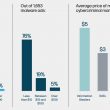Unpatched GPS-tracker security bugs threaten 1.5 million vehicles with disruption
Six vulnerabilities have been found in a GPS tracking device used by businesses to monitor vehicle fleets, and by consumers as an anti-theft device. If exploited, they could allow attackers to widely disrupt fleet operations and track individual vehicles.
That’s according to cybersecurity firm BitSight, which stated in a Tuesday advisory that the device, the MiCODUS MV720, has vulnerabilities in both the device and the back-end service. These pave the way for man-in-the-middle (MitM) attacks, authentication bypasses, and location tracking. The vulnerabilities include a hard-coded device password that allows access via SMS requests, and a default password on the API server, BitSight found.
“The exploitation of these vulnerabilities could have disastrous and even life-threatening implications,” BitSight states in the report. “For example, an attacker could exploit some of the vulnerabilities to cut fuel to an entire fleet of commercial or emergency vehicles. Or, the attacker could leverage GPS information to monitor and abruptly stop vehicles on dangerous highways.”
The vulnerabilities include a hard-coded password that could allow commands to be sent to devices, the ability to use administrator privileges for commands, and a default password of 123456. Flaws of lesser severity include a reflected cross-site scripting (XSS) issue and the ability to directly access parts of the application. Five of the vulnerabilities have been assigned identifiers under the Common Vulnerabilities and Exposures (CVE) program: CVE-2022-2107, CVE-2022-2141, CVE-2022-2199, CVE-2022-34150, and CVE-2022-33944. The default password security weakness was not considered a vulnerability, and so did not get a CVE identifier.
GPS Bugs Remain Unpatched
While the company has not observed any signs that the vulnerabilities have been exploited, the Chinese firm that manufacturers the device, MiCODUS, has not responded to attempts at discussing the issues, says Stephen Boyer, co-founder and CTO for BitSight.
BitSight originally contacted MiCODUS about the problems in September 2021, and after an initial request for more information, the company refused subsequent attempts to communicate, according to the firm. MiCODUS did not immediately respond to a request for comment from Dark Reading.
“Unfortunately, the hard-coded password means that the only real remediation strategy is to remove the MV720 device or remove the SIM card from the device,” he says. The firm shared the bug information with the Department of Homeland Security, he added, in hopes that it could develop an appropriate remediation strategy.
“IoT devices are full of vulnerabilities, and this will not change going into the future no matter how many of these stories come out,” Roger Grimes, data-driven defense evangelist at KnowBe4, said via email. “IoT devices are particularly hard to patch. They should all be auto-patching, but most aren’t. Most require end-user interaction, and many times a physical connection.”
To read the complete article, visit Dark Reading.

















